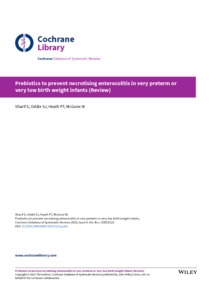Sharif, S; Oddie, SJ; Heath, PT; McGuire, W
(2023)
Prebiotics to prevent necrotising enterocolitis in very preterm or very low birth weight infants.
Cochrane Database Syst Rev, 6 (6).
CD015133.
ISSN 1469-493X
https://doi.org/10.1002/14651858.CD015133.pub2
SGUL Authors: Heath, Paul Trafford
![[img]](https://openaccess.sgul.ac.uk/115499/1.hassmallThumbnailVersion/Prebiotics%20to%20prevent%20necrotising%20enterocolitis%20in%20very%20preterm%20or%20very%20low%20birth%20weight%20infants.pdf)  Preview |
|
PDF
Published Version
Available under License ["licenses_description_publisher" not defined].
Download (524kB)
| Preview
|
Abstract
BACKGROUND: Dietary supplementation with prebiotic oligosaccharides to modulate the intestinal microbiome has been proposed as a strategy to reduce the risk of necrotising enterocolitis (NEC) and associated mortality and morbidity in very preterm or very low birth weight (VLBW) infants. OBJECTIVES: To assess the benefits and harms of enteral supplementation with prebiotics (versus placebo or no treatment) for preventing NEC and associated morbidity and mortality in very preterm or VLBW infants. SEARCH METHODS: We searched the Cochrane Central Register of Controlled Trials (CENTRAL), MEDLINE, Embase, the Maternity and Infant Care database and the Cumulative Index to Nursing and Allied Health Literature (CINAHL), from the earliest records to July 2022. We searched clinical trials databases and conference proceedings, and examined the reference lists of retrieved articles. SELECTION CRITERIA: We included randomised controlled trials (RCTs) and quasi-RCTs comparing prebiotics with placebo or no prebiotics in very preterm (< 32 weeks' gestation) or VLBW (< 1500 g) infants. The primary outcomes were NEC and all-cause mortality, and the secondary outcomes were late-onset invasive infection, duration of hospitalisation since birth, and neurodevelopmental impairment. DATA COLLECTION AND ANALYSIS: Two review authors separately evaluated risk of bias of the trials, extracted data, and synthesised effect estimates using risk ratio (RR), risk difference (RD), and mean difference (MD), with associated 95% confidence intervals (CIs). The primary outcomes of interest were NEC and all-cause mortality; our secondary outcome measures were late-onset (> 48 hours after birth) invasive infection, duration of hospitalisation, and neurodevelopmental impairment. We used the GRADE approach to assess the level of certainty of the evidence. MAIN RESULTS: We included seven trials in which a total of 705 infants participated. All the trials were small (mean sample size 100). Lack of clarity on methods to conceal allocation and mask caregivers or investigators were potential sources of bias in three of the trials. The studied prebiotics were fructo- and galacto-oligosaccharides, inulin, and lactulose, typically administered daily with enteral feeds during birth hospitalisation. Meta-analyses of data from seven trials (686 infants) suggest that prebiotics may result in little or no difference in NEC (RR 0.97, 95% CI 0.60 to 1.56; RD none fewer per 1000, 95% CI 50 fewer to 40 more; low-certainty evidence), all-cause mortality (RR 0.43, 95% CI 0.20 to 0.92; 40 per 1000 fewer, 95% CI 70 fewer to none fewer; low-certainty evidence), or late-onset invasive infection (RR 0.79, 95% CI 0.60 to 1.06; 50 per 1000 fewer, 95% CI 100 fewer to 10 more; low-certainty evidence) prior to hospital discharge. The certainty of this evidence is low because of concerns about the risk of bias in some trials and the imprecision of the effect size estimates. The data available from one trial provided only very low-certainty evidence about the effect of prebiotics on measures of neurodevelopmental impairment (Bayley Scales of Infant Development (BSID) Mental Development Index score < 85: RR 0.84, 95% CI 0.25 to 2.90; very low-certainty evidence; BSID Psychomotor Development Index score < 85: RR 0.24, 95% 0.03 to 2.00; very low-certainty evidence; cerebral palsy: RR 0.35, 95% CI 0.01 to 8.35; very low-certainty evidence). AUTHORS' CONCLUSIONS: The available trial data provide low-certainty evidence about the effects of prebiotics on the risk of NEC, all-cause mortality before discharge, and invasive infection, and very low-certainty evidence about the effect on neurodevelopmental impairment for very preterm or VLBW infants. Our confidence in the effect estimates is limited; the true effects may be substantially different. Large, high-quality trials are needed to provide evidence of sufficient validity to inform policy and practice decisions.
| Item Type: |
Article
|
| Additional Information: |
This Cochrane Review was published in the Cochrane Database of Systematic Reviews 2023, Issue 6. Cochrane Reviews are regularly updated as new evidence emerges and in response to feedback, and the Cochrane Database of Systematic Reviews should be consulted for the most recent version of the Cochrane Review.
Sharif S, Oddie SJ, Heath PT, McGuire W. Prebiotics to prevent necrotising enterocolitis in very preterm or very low birth weight infants. Cochrane Database of Systematic Reviews 2023, Issue 6. Art. No.: CD015133. DOI: 10.1002/14651858.CD015133.pub2.
https://doi.org/10.1002/14651858.CD015133.pub2 |
| Keywords: |
Humans, Infant, Newborn, Enterocolitis, Necrotizing, Infant, Extremely Premature, Infant, Premature, Diseases, Infant, Very Low Birth Weight, Infections, Humans, Enterocolitis, Necrotizing, Infant, Premature, Diseases, Infant, Newborn, Infant, Very Low Birth Weight, Infant, Extremely Premature, Infections, 11 Medical and Health Sciences, 17 Psychology and Cognitive Sciences, General & Internal Medicine |
| SGUL Research Institute / Research Centre: |
Academic Structure > Infection and Immunity Research Institute (INII) |
| Journal or Publication Title: |
Cochrane Database Syst Rev |
| ISSN: |
1469-493X |
| Language: |
eng |
| Publisher License: |
Publisher's own licence |
| PubMed ID: |
37262358 |
| Dates: |
| Date |
Event |
| 2023-06-01 |
Published |
|
 |
Go to PubMed abstract |
| URI: |
https://openaccess.sgul.ac.uk/id/eprint/115499 |
| Publisher's version: |
https://doi.org/10.1002/14651858.CD015133.pub2 |
Statistics
Item downloaded times since 03 Jul 2023.
Actions (login required)
 |
Edit Item |



